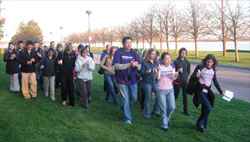Take Back the Night!

Participants and organizars marched along the harbor in “Take Back the Night!” last week.
April 29, 2005
BY SHUN HASEGAWAStaff Writer
On Thursday, April 21, in the student-organized event, “Take Back the Night: Help Break the Silence! Speak out against sexual violence!” survivors of sexual violence told their stories, as well as a presentation given by specialists on rape, domestic violence, and child sexual abuse.
At 6 p.m. on the Campus Center lawn across from the bus stop, the victims talked about their experiences of rape and abuse by their friends and boyfriends in front of a 30-member audience of primarily females. The memories were so vivid that some of them were unable to detail or confess in public.
A female student said that when she was a teenager, she was coerced into having sex with her brother’s friends at a New Year’s Eve celebration. After having sex with her, a six-foot tall abuser whom she had long known said that the New Year would come within five minutes. “Then everything would be washed away, and they would be friends again. After the incident, she was then harassed by an abuser’s girlfriend. The combination of these events caused her great depression, which resulted in treatment at a mental hospital.
“I found I was heavily scared [when she was abused.] But I didn’t have enough time to think or resist.” she said. “I have been afraid to talk about my experience. It is very important for me that I’m here today, and everybody listens to me.”
According to the U.S. Bureau of Justice, there are an estimated 680,000 people raped each year in the United States, 76.5 percent of the victims are females, with an average age of eighteen. 99 percent of the offenders are males.
The event was organized by Ph.D. students Heidi Barrett, Stephanie Day, and Liz Mongillo of the clinical psychology department at UMB, and was sponsored by the Health Services and Psychology Department.
“Survivors and friends and relatives of survivors should have a safe space
like this where they can share their stories in solidarity with one another,” stated the organizers the day after. “If even one person left last night knowing that she or he was not alone, or feeling empowered, then this event has served its purpose.”
The eight-and-a-half-hour event featured speakers on sexual violence from on and off campus: UMB Associate Professor of Psychology David Lisak, JD Claire Harwell, the Boston Area Rape Crisis Center, and the Center for Violence Prevention & Recovery.
Harwell, a lawyer who specializes in sexual abuse cases (she worked for the plaintiff in the NBA-star Kobe Bryant’s case), said that every process of criminal and civil justice in this country prevent victims recovery from emotional traumas.
She gave four points condemning the criminal justice system that sentences only one percent of sexual abusers. First, only a third of all assaults are reported due to the “stigma of victimization and internalized blame” of victims. Second, the police give a polygraph test to the abused before accepting their complaints and often do not take into account the trauma the victim has just endured. Third, prosecutors seemingly neglect many victims due to their want of a winning case, which contributes to the conviction of only 20 percent of the accused. Fourth, juries don’t have sufficient knowledge of sexual abuse nor the ability to make a fair judgment, she said.
Harwell further argued that victims are vulnerable at civil court, because they are summoned and forced to “be naked” in front of their abuser and the public. Rubbed of privacy, the most important shelter for hearling, many victims suffer from Post-Traumatic Stress Disorder that causes depression, sleep disturbance, suicidal thoughts, and various mental disorders.
“Our justice system works as a tool of an offender to further violate the victims,” she said. “Courts send you a final paper and that’s it. But it’s never an end of the story for victims.”
Lisak, an author of Men and the Problems of Non-Relational Sex, criticized mainstream mediums for spreading stereotypical images of the “strange and brutal” rapists. This type of person is believed to wear ski masks and cause serious injury with a knife or gun.
Contrary to the widely-believed images, more than 80 percent of rapists aren’t strangers to victims, nor do they use physical force. Often, they are unsuspecting friends, family members, or citizens. One third of them have an access to consensual sex.
“Typical rapists tend to be angry at women, want to dominate women, and have hyper masculinity,” Lisak said. “They have deficits in empathy. Women’s physical resistance is just information to them.” He added that alcohol and pornography are determining factors in assault cases.
According to the U.S. Bureau of Justice, 62 percent of sexual assaults are committed by multiple offenders.
Lisak and Harwell agreed that educating students on campus is really important. Women from an age range of 18-24 are the most vulnerable to sexual abuse. One survey shows that one in every four female college students are victim of rape or attempted rape.
After the survivors’ speeches, the participants marched from the Campus Center to the third floor of Quinn Administration Building along the waterfront.
Exhibited on the wall in a room were more than 20 messages, some written in foreign languages, from survivors. One read, “Sexual assault makes us feel worthless. It makes us feel alone. But you and I are not worthless, not alone.”
One male participant said that he once hesitated to talk with a female friend who was a sexual abuse victim, “I appreciate that the survivors have courage to come and speak in front of strangers,” he said.










































































